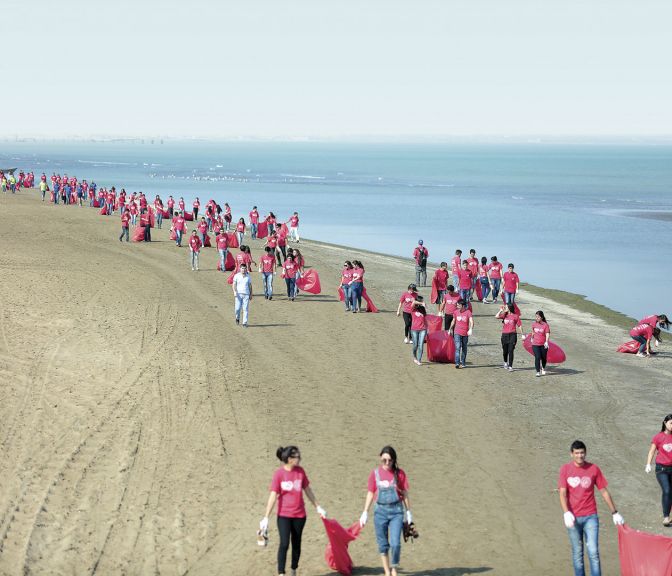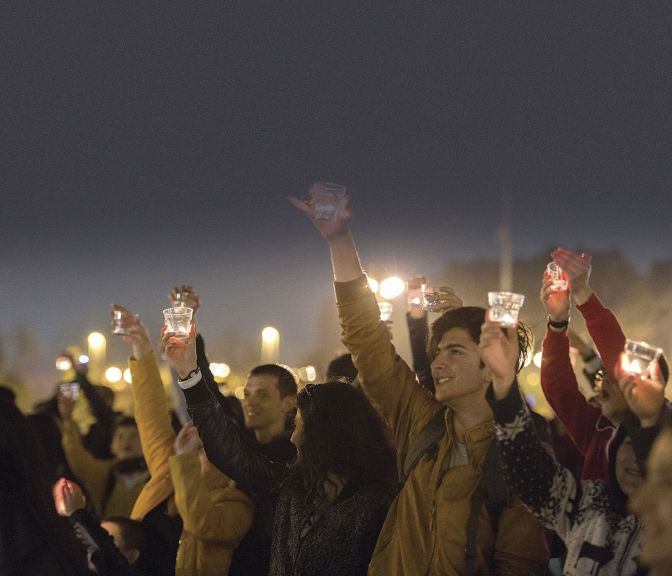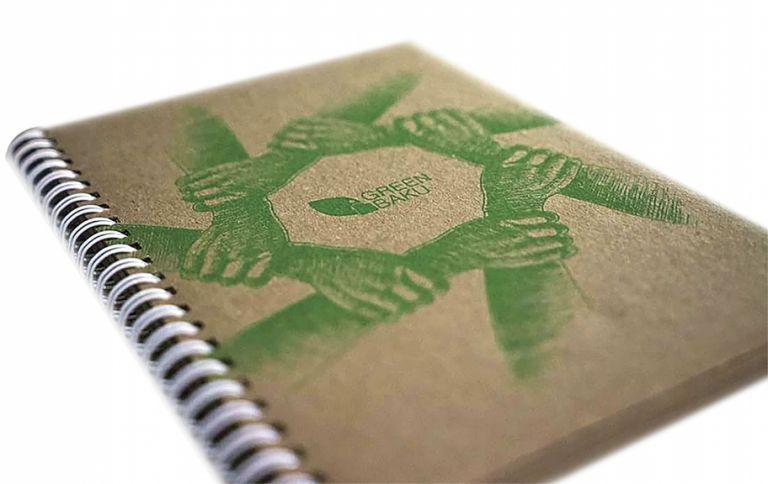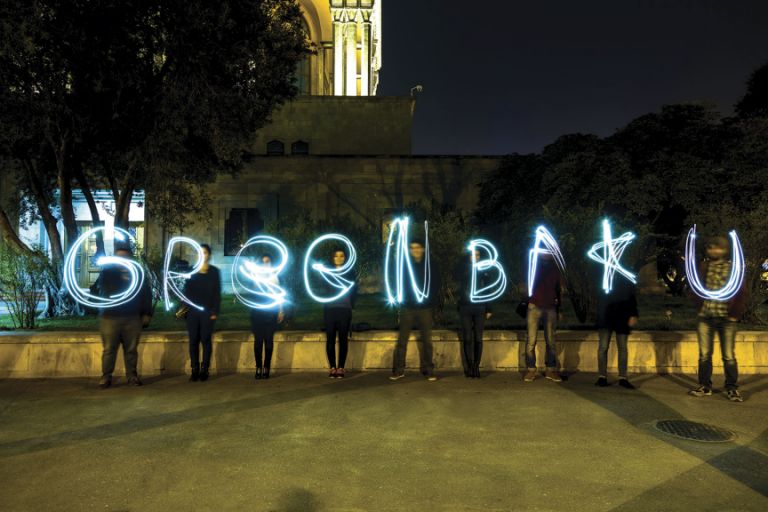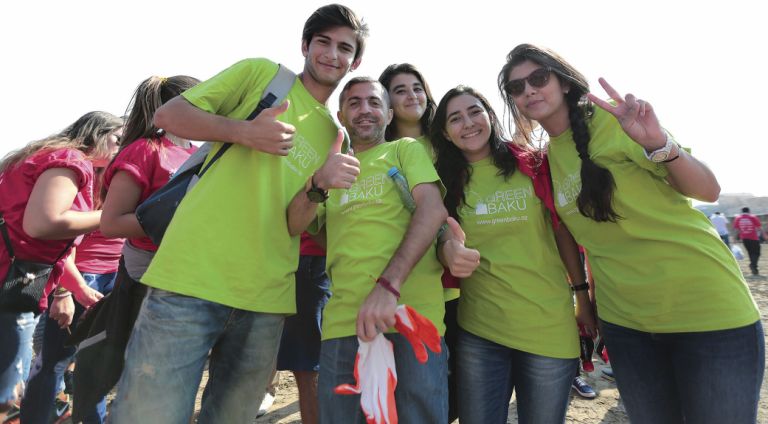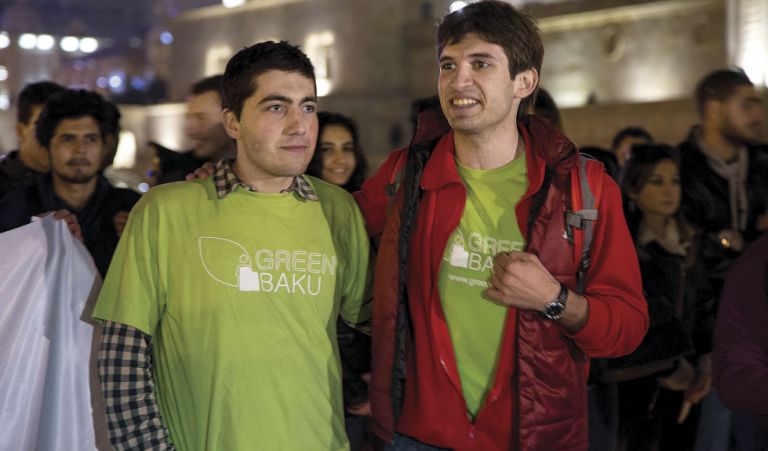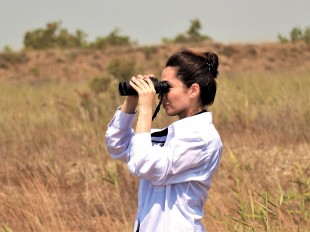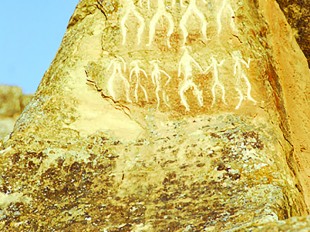Back in 2007, while walking on the beach picking up used bottles, I was introduced to cleanup volunteering for the very first time, as part of the preparation for my exchange year ahead. It was more of an introduction to the idea behind it rather than the action of cleaning itself. Now, nine years later, it seems like the local Baku community is more open to intergrating the idea of environmental action into their lifestyles, at least on some level.
A big role in the growing amount of environmental volunteers in recent years has undoubtedly been played by the required 40 hours of volunteering and environmental education our students are receiving while on exchange programmes abroad. This, in essence, means that one of the core aims of these programmes, which is to educate and to give young people the intellectual resources to bring positive change to their home countries, is actually being implemented.
On that note, it is my pleasure to introduce Green Baku, the first organisation in Azerbaijan, or how its chairman Samir Gadirov prefers to call it - ecological youth union - making its first successful steps in developing an environmentally friendly future for our country.
Global partners
Back in 2010, six volunteers started organising cleanup actions on the coast of the Caspian Sea with the single aim to inform and involve people in environmental action, so novel and foreign to Baku back then. Explaining to people why they need to take care of the environment was probably the most challenging aspect. Especially six years ago, when Facebook as a social platform wasn’t as popular in Azerbaijan. At first, the cleanup events were mainly popular with people who had studied abroad and those that were well informed about such ecological initiatives. Little did those six know that only half a year after the first cleanup their initial small group of volunteers would evolve into a huge movement with hundreds of participants, with ages ranging from 10 to 70.
After organising cleanup events for six years now, this movement is the most experienced in this sphere in Azerbaijan. Not only do they raise awareness about environmental action, but they have also managed to form good partnerships with local and international organisations like Green Peace, 360.org, while also being official partners (representatives) of the UN environmental programme Let’s Do It, which is the biggest cleanup action in the world. The aim of the latter is to gather 5% of the world’s population in cleanups by 2018.
We started cooperating in 2012 when I was just a volunteer there and last year, on the basis of this project, we organised a cleanup action at the Novkhani coastal site with the participation of 550 people - the biggest cleanup project ever in Baku, says Samir Gadirov.
The preferred time for cleanups, as Samir can tell from experience, is May, before the end of the school year and the start of the summer season, and after the summer season is over, when the coastal zone is particularly in need of cleaning. That way the coast is clean all autumn and winter.
Earth Hour, or the annual one-hour lights switch off, is another big event they organise. This year it is particularly special, since this collaborative project with WWF has ushered in a new phase for Green Baku, as not just a partner but the organiser of the event.
We have gathered hundreds of people and last year at Freedom Square we had more than 300 people, all gathered there voluntarily, lighting candles, showing incredible unity, recalls Samir.
Inception & collaboration with Azersun
Apart from involvement in the cleanup projects, being members of the Let’s Do It programme also meant forming good collaboration with other environmental organisations, and last November it gave the opportunity to study startup experiences in other countries, especially the US, Slovenia and Ukraine. The best experiences were encountered in Slovenia and Ukraine, and with Ukrainian people being socially very close to our people, according to Samir, the Ukrainian model found its way to Azerbaijan in the form of Green Baku, a commercial startup for the ecological stationery world.
The model was simple, to collect used paper and newspapers, give it to the factory, then buy the already recycled paper and produce something from it.
Samir explains: We analyzed our market in Azerbaijan, and found out that there are two recycling factories in the country, Temiz Sheher (Clean City –Ed.), where trash is burnt to produce energy and Azersun.
Initially, Green Baku was cooperating with Temiz Sheher, but due to the fact that burning also harms the ecology, they switched to the second factory, Azersun.
It has two active industrial sites, one in Sumqayit, Azerbaijan’s industrial city, and in Darnagul. It is the biggest company and all the recycled paper is produced for their own use. They have a huge project with IDEA (International Dialogue for Environmental Action - Ed.) and ASAN Xidmet (State Agency for the Public Service and Social Innovations - Ed.). The latter involves organising paper collection from all ASAN offices in Baku and the regions resulting in 5-10 tonnes of paper each month.
The used paper collection initiative is not very broad and takes place only in big stores like Bazar and Rahat Market. There are also special consultants sporadically visiting offices where they talk about the project and place a box which they retrieve when it gets full. But Azersun admittedly has a lazy strategy, because the production is mainly for its own needs and they don’t use most of the paper they receive to satisfy them.
That’s why for us it was perfect. We made a deal to buy part of that paper, sometimes even organising our own events collecting paper for the production, says Samir.
At the moment, Green Baku is the first and only such client for the factory, which has a production capacity of 100 tonnes. Of course a significantly lesser amount of paper is being produced, since there is little interest yet in recycled paper. And it is because of this low demand that the factory doesn’t have every paper type and the quality varies. The team is trying to be flexible and find mutually beneficial solutions for each side but at the same time the product has to appeal to the market. Bigger roundups should lead to increased interest from a factory to work on a new strategy for recycling and improving paper quality.
It is also important to note that, as Samir says, all the paper in Azerbaijan is imported, and building more facilities and producing recycled paper would mean importing less paper and producing more employment opportunities for Azerbaijanis. Both potentials are economically beneficial for our country, especially considering the fact that if recycled paper is bought in tonnes rather than in small quantities, it is cheaper than ordinary paper. There is undoubtedly an economic argument here, since instead of paying people in Russia, we could employ Azerbaijanis in the existing factories in the country.
Entering the ecological stationary world
Upon the proclamation of 2010 as a year of ecology in Azerbaijan, Green Baku started its activity. It is important to mention that the young members of this team really did put a lot of thought into the project. They don’t claim to be ecology specialists, but they have a passion for the environment and are specialising in a variety of other professions which, brought together in this union, can greatly benefit the cause.
The organisation has three very well defined aims for their startup, as Samir explains:
Firstly, to make a 100% Azerbaijani product, recycled paper for use, made on Azerbaijani factories. Second, to raise environmental awareness in our country, so people understand that with the use of recycled paper we could potentially stop a part of the production of paper from wood. People need to understand that we are able to make not only waste from products, but also products from waste. And thirdly, kind of connected with the second, we need to educate people about the distinction between recycled products and trash. A lot of people still think that a cup made out of recycled materials is dirty and equivalent to trash. We have to make a culture of using recycled products, to show that the paper is the same with the minor difference in colour, and as a result, Azerbaijan will be cleaner and environmentally more educated.
The team has estimated 8,000AZN in investments to be quite enough to produce all the products they have planned. They received their very first investment of 460AZN from a programme called Ideya Qazandi (The Winning Idea - Ed.) to be able to start their initiative. They have also been using the services of a business incubator called Youth Inc., with the support of the Ministry of Youth and Sports and Coca-Cola, which provides mentoring, business coaching, help with business ideas, startups. Every step of our development, we’ve been coached by them, says Samir.
With paper purchased from Azersun, Green Baku conducted their first experimental production of 200 notepads as well as A4 format paper. It was a multilevel experiment to see how the production works, and also people’s approach to it. Future plans for the stationary include production of frames, flash cards and calendars. A convenient future addition to their website (greenbaku.az) will be the ability to customize orders using their recycled paper. We’ll also have an option to print company brochures as well, adds Samir.
For the very first recycling campaign, they collected plastic and found out that there are facilities in Azerbaijan for recycling not just paper but also other materials such as plastic and glass.
So for the future, we are thinking if the stationery startup goes well, we are planning to recycle other materials as well, assures Samir.
In the process of research, Green Baku also found a lot of other people collecting paper, glass, bottles, plastic, polyethylene for reuse and recycling (locally produced bottles were reused, imported bottles were recycled) but this is mostly ‘black’ business, not registered with the government and therefore they prefer to stay in the shade, not to be open.
Design
From the variety of options, the GB team came up with the final front cover design of a circle of hands holding onto each other. This idea goes back to those six to eight volunteers and their youth movement, where it was not just about collecting trash but coming together for environmental action, raising hands against the trash. Inside, on the footer, adds Samir, we wanted to show the chain of steps it takes to produce our stationery; first, trees are cut down, then made into production materials that are used in the city, then they’re thrown away and we collect it and send it to the factory to produce our products.
Resistance
The estimated scale of potential clients is no more than three million in Azerbaijan, and those are mostly people who’ve studied abroad and are familiar with the idea of living green, says Samir.
With only one unsponsored post on Facebook, Green Baku managed to reach over 10,000 people on social media and, as expected, opinions were divided into two fronts. The bigger group, pleasingly, were in support of the initiative. But for a startup like Green Baku, it was the second group that contained all the answers about people’s approaches, their misunderstandings, and potential ways of clarifying the goals of the team.
The main argument of sceptics was about the questionable need to save trees if the paper is not produced in Azerbaijan: If the paper is 100% imported, why care about the trees in a different country? We are not saving our trees.
This is a good example of a common misconception that people in Baku have about the environment. As long as there is no awareness that just because paper is imported it doesn’t mean it is ecologically good for you, the understanding regarding ecological startups will be limited.
At the same time, there is also a certain social mentality about products produced locally. Whether or not it is vestiges of the Soviet past, when due to the shortages of local goods people believed that all good things were produced abroad, people still hold on to a prejudice, according to Samir, that the best products are exported from Azerbaijan (which leaves not much of a choice locally). And even despite the encouragement from the president himself and celebrities to use local products and help our economy, people are still a little hesitant to use locally produced goods.
In terms of cooperation with the government, the GB team has formed good contacts with governmental organisations, but also encountered complications. The reply to inquiries regarding recycling is always similar, implying that it is not the responsibility of the Ministry of Ecology to recycle trash; since recycled products represent economic value, it is the area of expertise of the Ministry of Industry and Economy: The factories are producing energy and new products, and this is not ecology, this is business, explains Samir.
A little more promising are Green Baku’s potential negotiations with the Ministry of Education, mainly regarding working with universities, since GB believes that they form the company’s main clientele. Negotiations are in progress with two local universities, the University of Economics and the University of Oil and Industry, and hopefully, says Samir, in September we will place paper collecting boxes there and also give informational presentations.
What’s next…
Every big journey begins with a single step. And although, as Samir admits, there is a lot ahead of us to reach the level of the UK and the US, which started years ago, we are aware that it may take up to 10 or 20 years or even a change of generation [for this process to settle in an unaccustomed society]…
I think that everyone, no matter in which profession they are, needs to do some volunteering. I always say that ecological volunteering is the most heartfelt and enthusiastic activity, because you don’t earn anything, you are just helping your environment and consequently yourself. We are not just a municipality that collects garbage and goes home, there is a very important reason for what we do. And we need people to know and understand it. Even my parents once in a while tell me to stop playing around with the trash and get a real job (he laughs). When you start learning about this process you see that, with a little bit of effort, everything is possible.
Doodling circles on the edge of my Green Baku notepad, it seems clear that despite there still being a lot of work ahead, we are living at a time of continuously advancing information technology. Fortunately, ever more Azerbaijani exchange students are coming back each year, bringing back intellectual resources to speed up the process of assimilating this new culture into Azerbaijani society.
On behalf of our team here at Visions of Azerbaijan, we would like to wish the best of luck to Samir and the Green Baku team in their current and future projects. Keep up the good work!